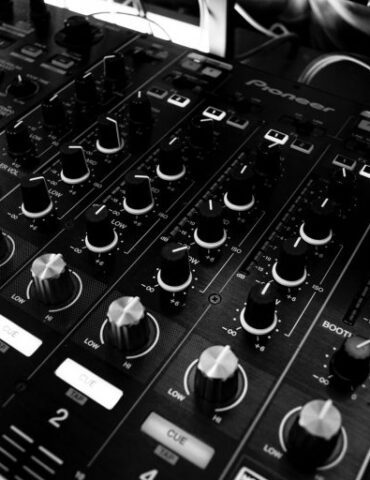-
 play_arrow
play_arrow
DisnDat HITZ DisnDat HITZ
-
play_arrow
Warlando Hitz Warlando Hitz
-
 play_arrow
play_arrow
DisnDat Tunez Reggae,Dancehall and Afro Beats
Common’s New LP With Pete Rock Might be His Best Super-Producer Collaboration Yet



The Auditorium, Vol. 1 is the new joint album from venerated emcee and multi-hyphenate Common, and fellow legend, super-producer Pete Rock — it’s a pairing of two of the most acclaimed hip-hop figures in the genre’s history. The producer who helped invent the soulful sound of classic hip-hop and the famed lyricist known for pensive wordplay have teamed up to deliver one of the year’s most inspired releases. It speaks to Common’s musical history, as the man born Lonnie Rashid Lynn, Jr. has always delivered his best work alongside another singularly creative mind.
Since the mid-1990s, it’s been a popular practice for the most noteworthy artists to recruit a cadre of hitmakers when it’s time to record an album. It’s become standard for artists to roll out a splashy list of big names on production when announcing their next project. But there’s something to be said for the classic approach of a singular producer guiding an artist’s vision; there’s no denying the potent chemistry of a Quincy Jones working with a Michael Jackson — even if it doesn’t always yield a “Thriller.”
And Common has consistently shown that he believes in that approach.
Going all the way back to when he was still known as Common Sense, the Chicago rap legend has never been one to use a hodgepodge of super-producers to craft his albums. In his over thirty-year career, Common has delivered his most inspired work when he’s locked in with an iconic producer. It speaks to the power of creative chemistry — he’s delivered masterworks alongside names like No I.D. and Kanye West that hearken to genre-defining albums that were crafted with that same approach. The kind of classics that came from Snoop teaming with Dre, or Prince Paul in the lab with De La Soul. This is about synergy.
He made his name in the now-hallowed 1990s, mostly working with fellow hometown product No I.D. on his debut Can I Borrow Dollar? and the pair musically grew together through the critically acclaimed Resurrection and mature introspection of One Day It’ll All Make Sense. The rise of Common and No I.D. helped cement Chicago’s hip-hop bonafides while also announcing both men as important artists who would go on to even higher-profile successes. These were the years where Common Sense grew into Common — all with No I.D.’s soulful sonics as a backdrop for the thoughtful emcee.
As Y2K dawned, Common was branching away from his Chicago comfort zone. On the 2000s watershed Like Water For Chocolate, he’d become fully enveloped in the creative hub of the Soulquarians, a neo-soul/hip-hop/jazz collective that also included D’Angelo, Roy Hargrove, Q-Tip, Erykah Badu, Mos Def, Talib Kweli, Bilal, James Poyser, J. Dilla, Questlove and others. The Soulquarians were on a creative high at the beginning of the 2000s — a run that included D’angelo’s Voodoo, Slum Village’s Fantastic, Vol. 2 and Badu’s epic Mama’s Gun. Common’s tenure in the Soulquarians saw his artistry grow by leaps and bounds, inspired by his musical peers’ expansive projects. 2002s Electric Circus may have been rejected by fans and critics at the time, but with two decades of hindsight, it’s a document of an artist pushing his creative boundaries and defying what hip-hop can look and feel like. In many ways, it’s the album most reflective of Common’s Soulquarian spirit.
But it was the backlash to Electric Circus that famously kick-started Common’s mid-2000s alongside another Chicago product. Teaming with Kanye reinvigorated Common at a time when there were alternate whispers that Hollywood had his full attention and his breakup with former girlfriend Erykah Badu had him in a personal and creative tailspin. With Ye behind the boards, Common got back to his Chi-town roots and delivered 2005s Be, the album that gave him a newfound mainstream audience; and he followed it with Finding Forever in 2007, another project heavily produced by Kanye that sonically draws immensely from Dilla, who’d passed away in 2006.
By the mid-2000s, Common was already being viewed as an elder statesman in hip-hop. For a genre that commentators still seem to believe doesn’t make for long careers, he’d begun a masterful second act. His acting career was thriving, but he was also in the midst of a musical run to rival his ‘90s stretch. But 2008s Universal Mind Control saw Common team with Pharrell, and the results weren’t what his previous albums had been. And as has been the case with the lukewarm reception to Electric Circus, Common went back to his Chicago familiars: this time re-teaming with No I.D. in a collaborative stretch that would continue through most of the 2010s.
That Common has found that same collaborative kismet with Pete Rock should come as no surprise. Rock has always been a super-producer who complements the rapper he’s working with — as opposed to a stifling hitmaker shoving any artist into his pre-established sound. Of course, he came to the fore paired with his Mount Vernon brethren CL Smooth, before branching out on his own to craft classics with everyone from Nas to Slum Village. His own discography only furthered his legend with collections like the Soul Survivor and PETEstrumentals series. And Rock’s “Soul Brother No. 1” reputation is well-earned: he’s a wizard of the vintage sample, a classic crate-digger who ties The Auditorium’s sonics in the rich tapestry of music history without ever sounding stuck in 1994. Prior to teaming with Rock, Common was in similar territory with producer Karriem Riggins, who’d produced his albums beginning with 2019’s Let Love. But there’s undeniable inspiration in tracks like the Bilal-featuring “So Many People” that speak to how much Rock and Common bring out the best in each other.
And it’s happening at a time when hip-hop’s veterans are finding new plateaus through collaboration. LL Cool J’s new album The Force is produced entirely by fellow Queens legend Q-Tip; while Nas has resurrected his creative partnership with DJ Premier for a new project. There’s no need to rehash cliches about rap no longer being a young man’s game. That’s been proven for a while now. But it’s great to see greats crafting brilliant art together, and finding inspiration in careers that no longer need to prove anything to anyone.
From Your Site Articles
Related Articles Around the Web
Written by: jarvis
Similar posts
-
Recent Posts
- Travis Scott-Signed Cactus Jack Trading Cards for Sale on eBay
- Real Boston Richey Feat. GloRilla – Get In There
- The Obamas Brought “Ether” Energy to 2024 DNC Speeches
- Funniest Tweets From Lil Jon’s Fired Up Performance at 2024 DNC
- Who’s Going To Tell Him The Job He Is Seeking Might Be One Of Those Black Jobs?” Michelle & Barack Obama Got At Donald Trump… They Snapped!
Recent Comments
Featured post
Latest posts

Travis Scott-Signed Cactus Jack Trading Cards for Sale on eBay

Real Boston Richey Feat. GloRilla – Get In There

The Obamas Brought “Ether” Energy to 2024 DNC Speeches

Funniest Tweets From Lil Jon’s Fired Up Performance at 2024 DNC

Who’s Going To Tell Him The Job He Is Seeking Might Be One Of Those Black Jobs?” Michelle & Barack Obama Got At Donald Trump… They Snapped!
Current show
Upcoming shows

Art Of Gossip
Monday and Friday at 23:00
12:00 am - 1:00 am
ChillBeats
Presented by Monica Deep
1:00 am - 2:30 am
Family Affairs
With Sebastian Troy
2:30 am - 5:00 am
Sick Beats
Dj Smash will make you move
5:00 am - 7:00 am
Hipster Morning
With Jack M.
7:00 am - 10:00 amChart
Chart
-
Top popular

Female Corrections Officer Who Got Smashed In Front Of 11 Inmates… Wants You To Bail Her Out! (6 Sec IG Message)

Music, Economics, and Beyond

Geez, Wait Till You See It From The Back: Recoil Like A Mac10 With No Attachments!

Stainless Steel Juicer – Making Juicing Fun And Easy

She's A Certified Freak: Chick Explains How Much She Loves Sucking D & The Lengths She's Gone To Do So!
Quick links
Our radio.
COPYRIGHT All rights reserved.
Site Design by Superior Business Solutions.











